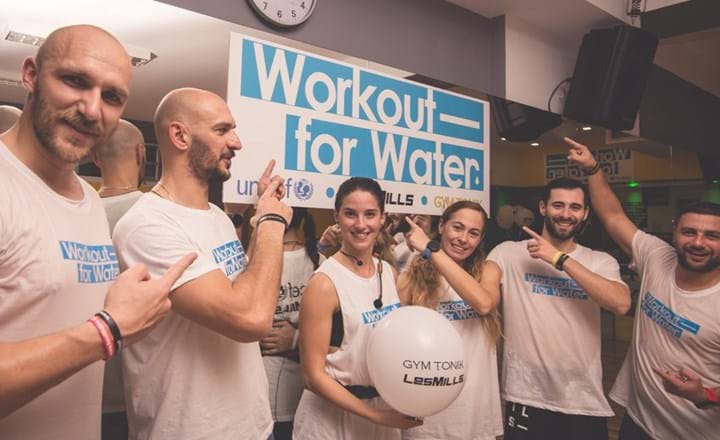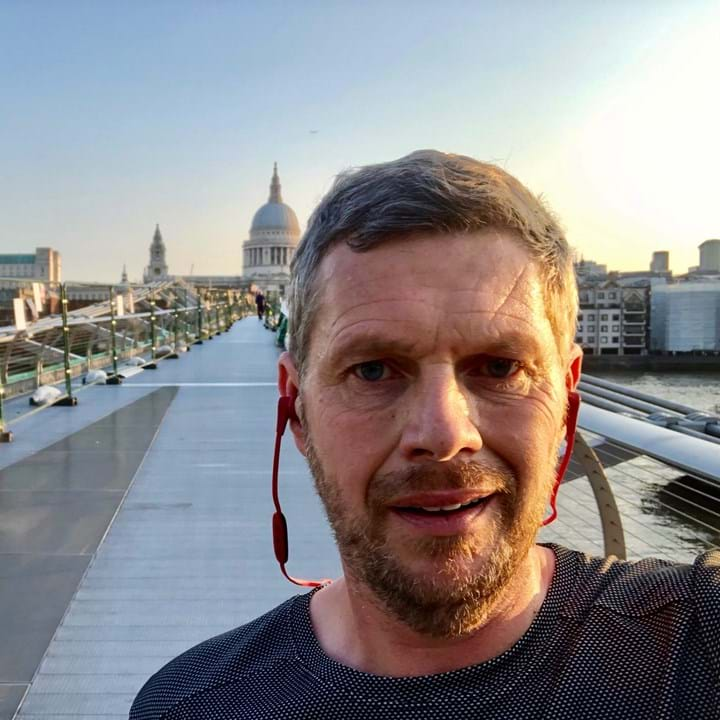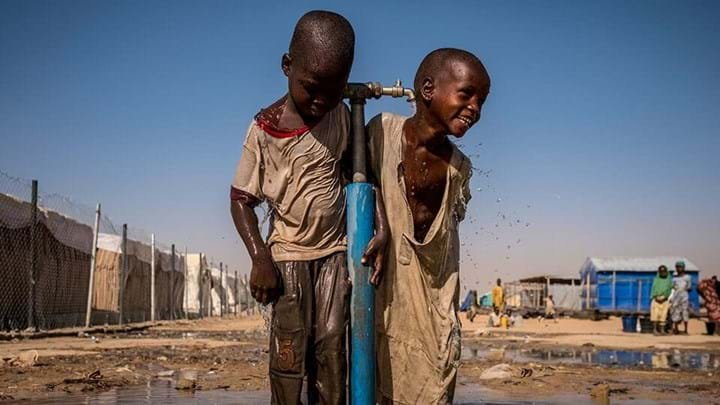
The world of corporate social responsibility (CSR) has changed dramatically over the past decade, as businesses have come to understand and value the importance of being a force for good.
Done with authenticity and commitment, CSR can be an incredible tool for lifting awareness of a business, building engagement among staff and earning respect in the eyes of today’s socially-conscious consumers.
As an industry which brings health and happiness to millions, the physical activity sector is uniquely positioned to play a prominent role in driving positive changes through CSR.
Through Workout for Water, UNICEF and Les Mills are working in partnership to lead an initiative that helps battle climate change and bring clean, safe and sustainable water to one of the poorest parts of the world. We’re aiming to install solar-powered water systems by raising US$5m to supply clean, safe and sustainable drinking water for children in the Amhara region of Ethiopia.
In 2017, we raised US$1.1m by running Workout for Water fitness fundraisers in over 65 countries. And in 2019, we’re taking things one step further. We’ll be theming Les Mills quarterly workout releases around Workout for Water, to support clubs and Instructors in running a series of special fundraiser events around the world.
It’s been a journey of discovery – and we’re only just getting started – but already we’ve gleaned some invaluable insights. So, whether you’d like to join Workout for Water or start your own project, here are 7 key learnings on what it takes to drive a successful CSR initiative.

1) Make sure the initiative aligns with your company values
When it comes to setting up a charity initiative, or one that your business wants to support, the most important factor by far is values alignment. Finding something that’s a really good fit for who you are as a business. If an organisation truly wants to make a meaningful impact, because it’s a topic they genuinely care about, then all of the other answers and business benefits will flow from there.
When we were scoping the partnership with Les Mills and came up with the concept of 'Workout for Water', we realised that water resonates deeply with all of us. We wanted to really run with that and lift it into a meaningful mission that could have significant impact. Also, we wanted to ensure we were addressing some of the environmental concerns that are such a big focus for Les Mills and their mission to create a Fitter Planet. So by finding a common reference point in water, and joining this up with fitness and environment in a way that can genuinely transform communities, we knew we were onto a winner.
2) Find a fitting partner
UNICEF engages with businesses worldwide – it's a big part of what we do – and picking the right partner to team up with on a corporate social responsibility (CSR) initiative is absolutely key. You've got to work out whether your values align, and for an organisation like ourselves, we have to provide benefits beyond just being a good cause. We have to ensure that the business is receiving value and heightening its brand by association with someone like UNICEF. A huge part of any successful initiative is finding the right business that gels to your values.
The beautiful thing about Les Mills is that their values of 'One Tribe, Be Brave, Change the World', really resonate and are something that lots of people want to be a part of. Also, their ability to reach out to an extensive network, which is passionate and young, is also a major positive. Historically, UNICEF's supporters have come from a much older demographic, so the digital awareness and marketing ability of Les Mills is a huge plus, aided by the fact that they’re just wonderful people to work with. But it just seems like the intrinsic motivation, which is the thing that we look for most with a partner, is deep within them.
3) Strive for sustainability and lasting impact
A lot of CSR initiatives do a great job mobilising people and drawing intense short-term focus to issues, but the key to real, long-lasting change is sustainability. These kinds of projects are the ones that really resonate, and can be true catalysts for change. Workout for Water is a prime example, because it provides people with water: which is such a vital resource.
If you haven't got water, it holds a child and their community back from so many things, such as being able to go to school, or being free of water-borne diseases. If you can provide a source of clean and safe water, then girls can go to school and children have a chance to survive and thrive. Meanwhile, communities can grow crops and clean them, stimulating economic activity and tackling poverty.
4) Be ambitious
A bold mission is key to mobilising large groups of people and creating something they can truly believe in. People are inspired by the prospect of big change that brings even bigger results. When we first started talking to Les Mills, we were looking at whether we could do something that would be focused solely on the Les Mills Instructor network. But Phillip Mills challenged us to be bolder. He said: ‘It has to be bigger. We have the opportunity here to do something truly impactful on a much greater scale.’ And so we took on the challenge and aimed higher.
It was a rollercoaster, there lots of highs, lots of lows, lots of stakeholders, lots of opinions, but together we made it work. We raised money in 65 countries – including countries like Iraq, Colombia and Nicaragua – which has never been done before in the world of UNICEF. And we ran the campaign across four different languages, another UNICEF first. There were so many great stories – like the person in Lithuania who raised $5,000 in one day – it was just incredible. Being able to harness that energy and come together on a global scale was remarkable, and a bold mission statement is key for crossing borders and inspiring thousands to join you on that journey.

5) Lead with action
For a long time, businesses felt that CSR and development wasn't their job. We looked to either individual philanthropists or to governments to take the lead with aid projects. But what we're seeing now, certainly with Millennials and Gen Z, is that their lives are not just about working for organisations for a pay cheque. They want to see meaning and responsibility entrenched within these businesses, and they want to be part of something bigger. We can all do our little bit, and businesses definitely have a role to play.
There are also myriad benefits that stem from this. If a business can show it’s socially responsible and has additional purposes beyond making a profit, then this can significantly enhance its ability to attract and retain top talent. Also, it gives businesses an opportunity to talk about issues broader than simply what they do. I think for Les Mills, there were lots of different reasons to connect with UNICEF, but one of them was being able to talk about something that wasn't the normal day-to-day business, but was also really meaningful and had global impact. It adds new dimensions to the discourse of your business and also the types of conversations you can have with your customers. We’ve seen gym chains like Equinox and others do this very effectively in recent years.
6) Make the most of the industry you’re in
One of the best things about fitness is that it’s is a win-win industry. Every single visit to a health club brings a wide range of benefits to the participant, while also supporting the long-term success of that business. I also think the fact that everyone who engages in physical activity cares about their body and their overall wellbeing is significant. It means they have a real personal motivation to be a balanced and well-rounded human, and this includes getting behind CSR initiatives.
As an industry, fitness is young, innovative, constantly changing and very dynamic – all of which make it ideally-placed to lead impactful initiatives. These reasons also make fitness a terrifying space for a charity to be in, because historically, organisations like UNICEF are incredibly risk averse – we have to be to maintain our integrity. But that's the excitement and opportunity that the fitness industry offers to break new ground. It’s fun, it’s powerful and it has a rare ability to move and inspire people.
There are a number of people in the fitness club community who do some wonderful CSR initiatives, and I think a lot of these organisations can be guilty of not shouting about it enough. Some people just do it because they believe in it, which is fantastic. But if they take a bit more of a proactive marketing approach to these initiatives, they could make an even bigger impact and really grow their audience.
7) Consider the long-term benefits CSR can bring to your business
I mentioned the progress of CSR in the past decade and many businesses are now looking at these projects not just through a marketing lens, but from a triple bottom line perspective. Where once the focus was solely profit, it’s now shifted to how companies can make profits in a way that’s good for the environment and good for their people. This is becoming an increasingly important factor for businesses being able to attract outside investment. It’s also key for carving out a unique selling point that helps you stand out against competitors, particularly in the eyes of Millennials and Gen Z. Young people will vote with their feet, whether that's talent that you're trying to attract or whether that's customers. So if you've got a strong CSR program, talk about it, show people, because it needs to be seen. When done with authenticity and with commitment, CSR can be an incredible tool for raising awareness of a business and demonstrating clear purpose.
Start today
Workout for Water 2019 sees UNICEF and Les Mills asking clubs and Instructors to set up fundraising pages, promote and run events, and encourage their club members and communities to fundraise alongside them.
Clubs and Instructors can choose when and how they would like to promote Workout for Water throughout the rest of 2019. They’ll be supported along the way with everything needed to succeed, including resources, downloadable collateral, social media guides and suggested timelines.
Clubs can support their Instructors to run the signature workouts during Workout for Water and promote the event within their venue using the resources provided.
Visit https://www.workoutforwater.org for all the key info and get ready to make a massive difference to thousands of lives by joining Workout for Water 2019.
Chris is the UNICEF project manager for Workout for Water. An ardent supporter of child rights, Chris works globally across multiple agencies, departments and external consultants to turn great ideas into reality, from inception to delivery and reflection. He loves BODYCOMBAT™ and running especially with an earful of Bruce Springsteen tunes.
